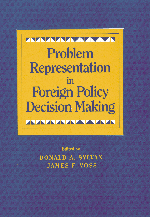Book contents
- Frontmatter
- Contents
- List of Contributors
- Part I Introducing Problem Representation
- Part II Overarching Conceptual Issues
- Part III Empirical Analysis
- 7 Problem Representations and Political Expertise: Evidence from “Think Aloud” Protocols of South African Elite
- 8 Reasoning and Problem Representation in Foreign Policy: Groups, Individuals, and Stories
- 9 Representing Problem Representation
- 10 A Problem-Solving Perspective on Decision-Making Processes and Political Strategies in Committees: The Case of Controversial Supreme Court Justice Nomination Hearings
- 11 When Gender Goes to Combat: The Impact of Representations in Collective Decision Making
- 12 Representations of the Gulf Crisis as Derived from the U.S. Senate Debate
- 13 Configuring Issue Areas: Belgian and Dutch Representations of the Role of Foreign Assistance in Foreign Policy
- Part IV Conclusion
- Index
7 - Problem Representations and Political Expertise: Evidence from “Think Aloud” Protocols of South African Elite
from Part III - Empirical Analysis
Published online by Cambridge University Press: 12 October 2018
- Frontmatter
- Contents
- List of Contributors
- Part I Introducing Problem Representation
- Part II Overarching Conceptual Issues
- Part III Empirical Analysis
- 7 Problem Representations and Political Expertise: Evidence from “Think Aloud” Protocols of South African Elite
- 8 Reasoning and Problem Representation in Foreign Policy: Groups, Individuals, and Stories
- 9 Representing Problem Representation
- 10 A Problem-Solving Perspective on Decision-Making Processes and Political Strategies in Committees: The Case of Controversial Supreme Court Justice Nomination Hearings
- 11 When Gender Goes to Combat: The Impact of Representations in Collective Decision Making
- 12 Representations of the Gulf Crisis as Derived from the U.S. Senate Debate
- 13 Configuring Issue Areas: Belgian and Dutch Representations of the Role of Foreign Assistance in Foreign Policy
- Part IV Conclusion
- Index
Summary
Introduction
The main focus of this study is cognitive processes of political elite with particular emphasis on the ideas of expertness and problem representation. Generally speaking, political expertise is ascribed to policy makers - elected, appointed, or anointed - but few efforts are made to map the cognition of these people, including their problem representations. As Beasley (this volume), Dyson and Purkitt (1986a), Voss (this volume), Purkitt (1991), and Sylvan and Thorson (1989, 1992) note, public policy decision making emanates from a “pre-decision” phase - a phase in which policy makers develop an initial representation of a problem and use the representation to understand and solve the problem. During this pre-decisional phase, an understanding of the form and structure of a problem is developed (Paige 1958; Pruitt 1965; Snyder and Paige 1958). This understanding affects subsequent stages of decision-making activity.
In politics, decision activity is often described as a function of experience where decision makers and analysts are seen as experts while those not meeting some minimal criteria are seen as novices. Research on problem-solving behavior and studies of differences between experts and novices in a variety of judgment and decision tasks provide a body of findings about the relative abilities of experts and novices in subjective decisional tasks. The standard practice in these decisional-task studies is to compare experts with novices. While controversy remains regarding the alleged superior performance of experts in comparison with novices (see for example, Anderson 1988; Chan 1982; Einhorn, 1974; Einhorn and Hogarth 1978, 1981; Gaeth and Shanteau 1984; Purkitt and Dyson 1990; Shanteau 1987, 1989; Slovic, 1972; Tetlock, 1992), a comparison of experts and novices is largely absent from political science research.
Although attentiveness to the importance of the differential knowledge, cognitive schemata, experiences, and cultures of different types of “experts” for understanding variation in political analysis and choice behavior exists (see, e.g., George 1980, 1993), the nature of political expertise seen in terms of variations in cognitive activities and problem-solving abilities has received little attention. (For exceptions to this general trend, see Anderson 1987, 1988; Beasley, this volume; Dyson and Purkitt 1986a; Sylvan, Ostrom, and Gannon 1994; Sylvan and Haddad, this volume; Purkitt and Dyson 1988, 1990; Voss and Dorsey 1992; Voss, Greene, Post, and Penner 1983; Voss and Post 1988).
- Type
- Chapter
- Information
- Problem Representation in Foreign Policy Decision-Making , pp. 147 - 186Publisher: Cambridge University PressPrint publication year: 1998
- 4
- Cited by



